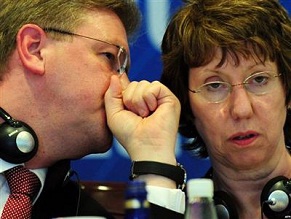|
World Jewish News

EU foreign policy chief Catherine Ashton (R) and Enlargement Commissioner Stefan Fule (L) said the democratic process in Ukraine had been “marred by irregularities, delays in the vote count and lack of transparency in the electoral commissions”.
|
EU leaders concerned by post election climate in Ukraine ‘which was marred by irregularities, delays in the vote count and lack
13.11.2012, Jews and Society EU leaders continued to express their dismay at ongoing “electoral irregularities” registered in Ukraine, following the country’s elections on October 28, which has seen as yet “inconclusive results” declared across five constituencies.
Highlighting their utmost concern, following extensive monitoring of the as-yet unresolved polls, foreign policy chief Catherine Ashton and Enlargement Commissioner Stefan Fule said the democratic process had been “marred by irregularities, delays in the vote count and lack of transparency in the electoral commissions”.
Concluding that the aforementioned deficiencies combined with the authorities’ reluctance to address earlier concerns raised by the EU’s electoral monitoring mission to the country represented a “deterioration in several areas compared to standards previously achieved”.
Calling on the Ukrainian Premier to honour his commitment to “reflect the genuine will of the Ukrainian voters”, Ashton and Fule issued a joint statement demanding “swift and determined action by the government and all other relevant state authorities including by addressing the inconclusive results...(as well as) bringing the electoral legislation into line with European norms and standards”.
Despite reaffirming the EU’s ongoing commitment to Ukraine’s accession to political association and economic integration, the leaders cautioned this could only be achieve through “determined action by the Ukrainian government and parliament to consolidate the country’s democratic credentials, to pursue the rule of law, to address the consequences of selective justice and to vigorously pursue judicial and other critical reforms”.
Last month, Pawel Kowal, Chairman of the European Parliament’s Delegation to the EU-Ukraine Parliamentary Cooperation Committee, issued a statement criticising a Ukrainian court ruling to impose a fine on independent television station TVi. The enforcement of such a decision in the midst of a parliamentary election campaign, he insisted, constituted “a serious weakening of media pluralism in Ukraine”.
“The possibility of broadcasting by different media channels is one of the basic judgement criteria as to whether the elections are free and fair,” he added. The September 12 ruling by the Ukrainian Court of Appeal found that the channel owed authorities the equivalent of €300,000 in unpaid taxes, thereby restricting the station’s transactions with foreign media partners and removing from a list of 80 operating cable tv networks in Ukraine.
The parliamentary delegation’s criticisms of media bias followed similar objections in July to reports of inspections by government and tax agencies of media outlets, which it claimed ran contrary to the parliament’s February resolution to ensure “the unimpeded activity of the media during election period in 2012”.
Former Polish President Aleksander Kwasniewski, who was charged with heading the EU’s electoral monitoring mission to Ukraine” said that the “test to have free and fair elections is decisive for the future of Ukraine”. Contending that it was the only way of pursuing open dialogue between the EU and the former Soviet state, who have negotiated an as-yet unsigned association agreement, he added that despite the challenging political climate in the country following 70 years of Soviet rule, “I'm much more optimistic about Ukraine than many other post Soviet countries”.
MEPs have previously expressed concerns about the jailing of Prime Minister Yulia Tymoshenko and other key opposition politicians and how the administration treats political rivals. The European Parliament has also called on Ukraine “to respect the principles of the rule of law and democracy if it wants closer relations with the EU”.
EJP
|
|
